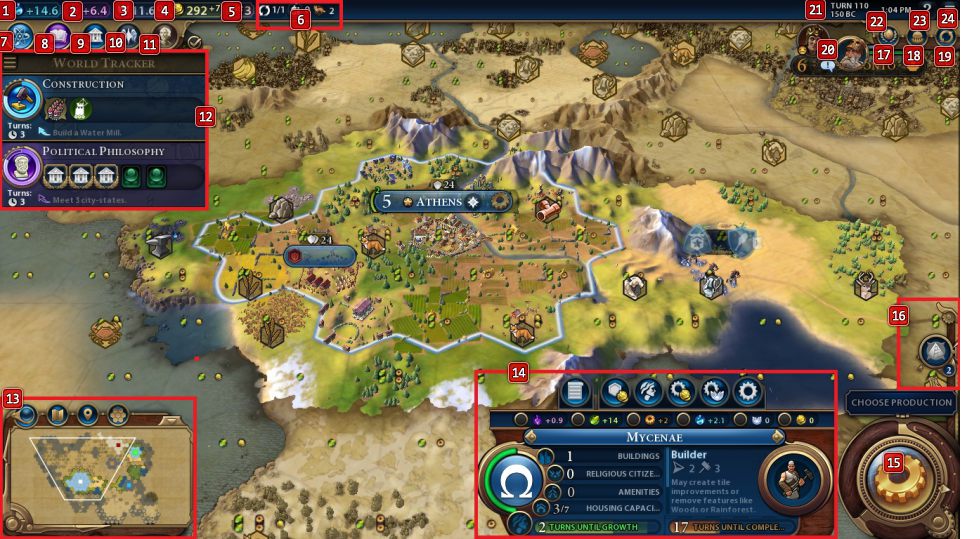

It may be that my settings helped, but there are some games that just turn out to be quieter than others. After we made peace, I did not face any declarations of war, even though many of the civs hated my guts (more on that later). Two civs declared war on me in the ancient era, but never bothered to actually attack. Looking back at the game, I think I mainly got lucky. My only hope was to avoid violence and defeat. I did not pick any victory condition as a target. I was not aiming to win, only to survive without violence. I chose France as my civilization, for no particular reason. I played on an epic map with the biggest timeline.

I decided to stick to my island and not to expand onto any other landmass, where I might clash with an acquisitive and hostile AI. My island was big enough for four cities, and had no city states or rivals. It may be that this map makes no real difference, but being on an island also provided a natural border that was clearly "mine." I picked the island map, on the basis that islands are often isolated in early game, and so it's possible to avoid early declarations of war from aggressive, nearby neighbors.

Polygon talks to the man who's been guiding Civilization games for 25 years, about how he tries to keep new games fresh, and about those crazy AIs. Early in my game, Rome was invaded and subjugated by Scythia, for example. Disabling Domination does not disable combat and war. This also avoids a situation where the number of rivals decreases to just a few militarily aggressive and expansive enemies. I also disabled the Domination victory condition, so that rival civs might seek more peaceful routes to victory. Leaving barbarian encampments alone also means avoiding prime city locations. A player who leaves barbarians to fester faces an endless game of defending trade routes, builders, improvements and settlers. So I switched them off.īarbarians are a design feature that encourage players to build military units early on, clearing their desired land mass of destructive enemies which yield cash when killed. There's no way to play, so far as I can tell, without killing them. These guys are aggressive and will attack viciously from the very start of the game. I had to make some changes in advanced settings before playing my game. So how do you play the game as a strict pacifist, and what's the point of it? It is very difficult to create an advanced, confident civilization with a small number of cities, and it's almost impossible without a strong military. The more cities you own, the more capital you generate, the more religion, culture, science, gold, military units you are able to acquire. If a rival starts homing in on a non-military victory condition, a sudden invasion can spoil all their sneaky peacenik plans.Ĭivilization 6 is a numbers game. Military might is also useful in late game. The more land you own, the less for everyone else.

Size of empire yields a lot of points, and it's a zero-sum situation. But military might is also useful to win a points victory. The most overtly militaristic victory condition is Domination, in which the player must capture all rival capital cities. How do you play as a strict pacifist, and what's the point? But these victory conditions are almost always predicated on a strong military, and perhaps an aggressively imperialist foreign policy. It's possible to win the game through a technological space race, or cultural / religious dominance. As in real history, all Civ sessions feature intense rivalries between competing nations which often spill into open conflict.Ĭiv 6's design strongly encourages use of military units as a means to victory. The game purports to simulate the rise of a society from ancient times to the near-future. By playing as a pacifist, I wanted to see if it was possible to survive, abiding by a strict policy of non-violence. Civilization 6 is designed to make you fight. In all my 20-odd years playing Civ games, this is a first for me.


 0 kommentar(er)
0 kommentar(er)
